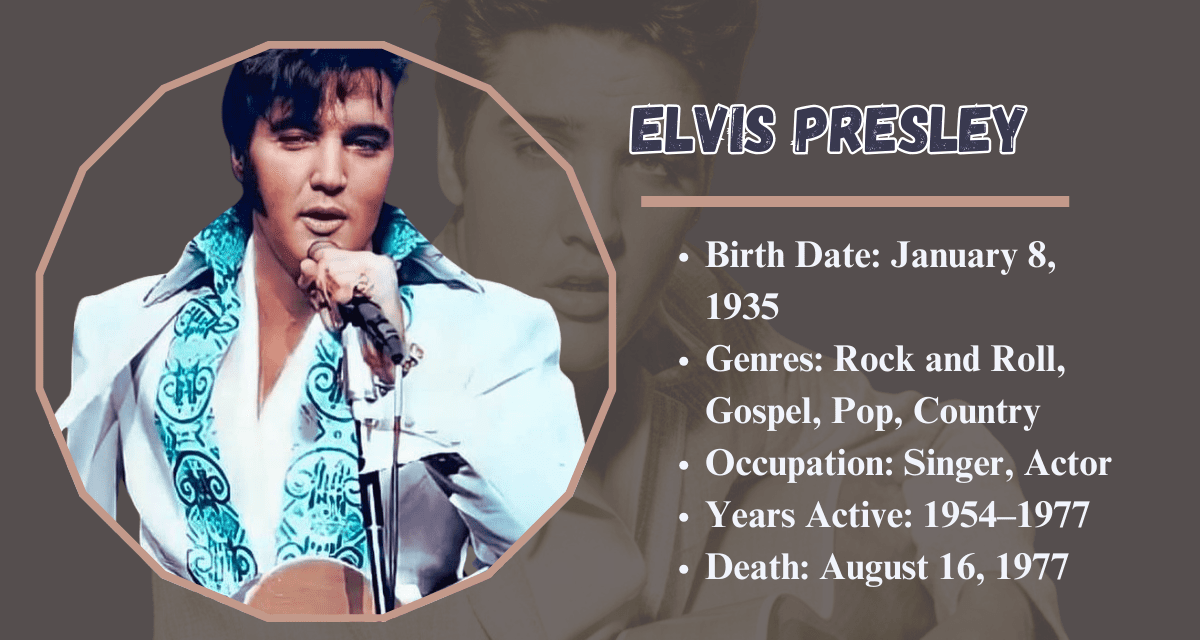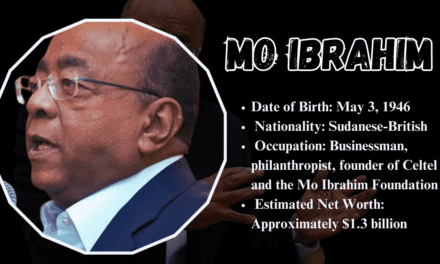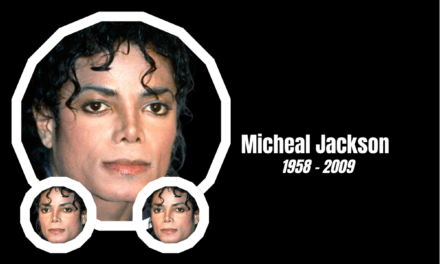Quick Facts about Elvis Presley:
- Full Name: Elvis Aaron Presley
- Birth Date: January 8, 1935
- Birthplace: Tupelo, Mississippi, USA
- Genres: Rock and Roll, Gospel, Pop, Country
- Occupation: Singer, Actor
- Years Active: 1954–1977
- Death: August 16, 1977, at age 42 in Memphis, Tennessee
Early Life and Family
Elvis Presley was born in Tupelo, Mississippi, to a working-class family that faced economic hardships. His twin brother, Jesse Garon, was stillborn, which left Elvis as the only surviving child of Vernon and Gladys Presley. Growing up in a small, modest home, the Presley family was extremely close, and Elvis shared a particularly deep bond with his mother. His family’s financial struggles meant that Elvis understood the value of hard work from a young age. Raised in a close-knit and religious environment, he was exposed to gospel music at church, which would profoundly influence his musical style.
Early exposure to gospel and blues music, combined with his love for country sounds, would later form the foundation of his unique musical blend. As a child, Elvis was known to be quiet and polite, but he had a natural love for music. He would often sing along to gospel hymns, which his mother encouraged. When he was 11, his mother bought him his first guitar, and it wasn’t long before he began playing and singing for family and friends. His love for music was undeniable, and it quickly became evident that Elvis had a special talent that set him apart.
Musical Beginnings and Rise to Fame
When Elvis was 13, his family relocated to Memphis, Tennessee, where he would be exposed to an even wider range of musical styles. In Memphis, he was surrounded by a mix of gospel, blues, rhythm and blues, and country. This fusion of sounds inspired him, and he started exploring how he could incorporate these influences into his own music. In 1954, he was signed by Sun Records, where he recorded his first song, “That’s All Right.” This song was groundbreaking; it blended R&B with country, creating a new and exciting sound that audiences loved.
His unique voice, emotional delivery, and stage presence made him an overnight sensation. People were drawn not only to his music but also to his charisma and energy. By 1956, he had achieved national fame with the release of “Heartbreak Hotel,” a song that became a chart-topping hit and marked the beginning of his reign as “The King of Rock ‘n’ Roll.” Songs like “Blue Suede Shoes” and “Hound Dog” followed, and they too became instant hits. Elvis’s style and performances were bold, breaking social norms and captivating audiences with his signature hip-shaking moves, which became a defining feature of his performances.
Impact on Popular Culture
Elvis Presley wasn’t just a musician; he was a cultural icon. His rise to fame marked a turning point in American culture, symbolizing a new era of rebellion, freedom, and youth empowerment. His unique style challenged traditional norms, introducing a fresh, exciting sound and image that resonated with young people. He was more than just a singer; he became a trendsetter in fashion, music, and dance, inspiring countless fans and future artists. His fashion choices, like his iconic pompadour hairstyle, leather jackets, and flashy suits, set him apart and became part of his brand. These style choices continue to influence artists and fashion trends today.
Elvis’s impact extended beyond music; he became a symbol of a generation seeking freedom and expression. His influence on youth culture was profound, with many viewing him as a figure who represented individuality and rebellion. By blending different genres of music, he broke down racial barriers, helping to introduce white audiences to traditionally Black musical styles, which was a groundbreaking move in the social climate of the 1950s. His popularity and bold style challenged social norms and sparked conversations about race, music, and culture, marking him as a pivotal figure in both musical and social history.
Acting Career and Hollywood Influence
Elvis’s talents were not confined to music. He also made a successful transition into acting, starring in 31 films over his career. His movies, such as Jailhouse Rock, Viva Las Vegas, and Blue Hawaii, showcased his charisma and further solidified his status as a pop culture icon. Although critics often debated his acting skills, his films were highly popular with fans and helped him reach a wider audience. His movies combined music and romance with lighthearted storylines, making them appealing to a broad demographic. Through these films, he introduced a new image of the “rock star” in Hollywood, inspiring other musicians to explore acting.
While his acting was sometimes criticized for its lack of depth, the commercial success of his movies spoke volumes about his star power. Fans flocked to theaters to see Elvis on screen, and his films earned millions at the box office. His film career also helped to cement his influence on Hollywood, as he brought a new kind of star quality that combined music, dance, and drama. Even though his movies were mostly lighthearted, they contributed to his overall brand and helped him to maintain his popularity throughout the 1960s.
Personal Life
Elvis’s personal life was as much in the spotlight as his career. In 1967, he married Priscilla Beaulieu, and they had one daughter, Lisa Marie Presley. Although they divorced in 1973, Elvis and Priscilla remained close friends, and he was devoted to his daughter. Despite his fame, he valued his role as a father and cherished the moments he spent with Lisa Marie. Elvis’s personal life contrasted with his public image, revealing a private, more sensitive side to the legendary performer.
His relationships and lifestyle were widely covered by the media, making him one of the first celebrities to experience the intense scrutiny that later stars would face. His life was filled with highs and lows, from moments of personal happiness to struggles with fame and pressure. The demands of his career and the challenges of maintaining a normal life in the spotlight took a toll on him. While he was loved by fans worldwide, his personal life often revealed a man who was still searching for balance and peace.
Later Years and Health Struggles
The pressures of fame, combined with a demanding performance schedule, affected Elvis’s health in the 1970s. His struggles with addiction to prescription medications led to physical and mental health issues. Despite his health challenges, Elvis remained committed to his fans and continued performing. He still captivated audiences with his powerful voice and stage presence, even as his health visibly declined. He performed sold-out shows in Las Vegas, proving that his popularity remained strong. However, the toll of his lifestyle became more apparent, and fans noticed the changes in his appearance and energy.
In his final years, Elvis was surrounded by both devoted friends and a team that enabled his lifestyle. His health struggles continued, and his passing in 1977 shocked fans around the world. Yet, his enduring dedication to music, even through difficult times, remains a testament to his passion and resilience. Elvis left an unforgettable mark on the music industry, and his legacy continues to inspire admiration and respect.
Legacy and Influence
Elvis Presley’s influence on music and culture remains unmatched. With over one billion records sold globally, he is one of the best-selling solo artists in history. His Memphis home, Graceland, has become a pilgrimage site for fans, symbolizing his lasting impact. Musicians across all genres, from rock to pop to country, cite Elvis as a major influence. His music and style continue to inspire new generations, with his songs remaining timeless classics. His legacy is celebrated annually at “Elvis Week,” when fans gather to honor his life and contributions to music.
Elvis’s lasting influence is evident in the countless artists who cite him as an inspiration. His innovative fusion of sounds and bold persona continue to shape music and popular culture. His songs, style, and spirit remain a source of inspiration, and his legacy has transcended generations, proving that his influence on music and culture is eternal.
Estimated Net Worth
At the time of his death in 1977, Elvis’s net worth was estimated to be around $5 million. However, his estate has grown significantly due to music sales, licensing, and Graceland’s popularity. Today, Elvis’s estate is valued in the hundreds of millions, making him one of the highest-earning deceased celebrities each year. His posthumous earnings illustrate the enduring appeal of his music and legacy.
Elvis Presley’s Official Pages and Websites
Elvis Presley’s official online presence includes several notable sites and social media accounts. His main website, ElvisTheMusic.com, offers news, music, and updates related to his legacy. Another key website is Graceland.com, dedicated to his historic estate, Graceland, which also features events, tours, and memorabilia.
For social media, his official pages include:
- Facebook: Elvis Presley
- Twitter: @ElvisPresley
- Instagram: @Elvis
- YouTube: Elvis Presley YouTube
These accounts are regularly updated with content to keep his legacy alive and connect with fans worldwide.
Conclusion
Elvis Presley’s journey from a small-town boy to the “King of Rock ‘n’ Roll” is an inspiring story of talent, dedication, and impact. His music broke barriers, inspired countless fans, and introduced a new sound that changed American culture forever. Even decades after his passing, Elvis remains a cultural icon and a pioneering figure in the music world. His story, filled with triumphs and challenges, continues to captivate fans, reminding the world of the lasting power of his music and legacy.





